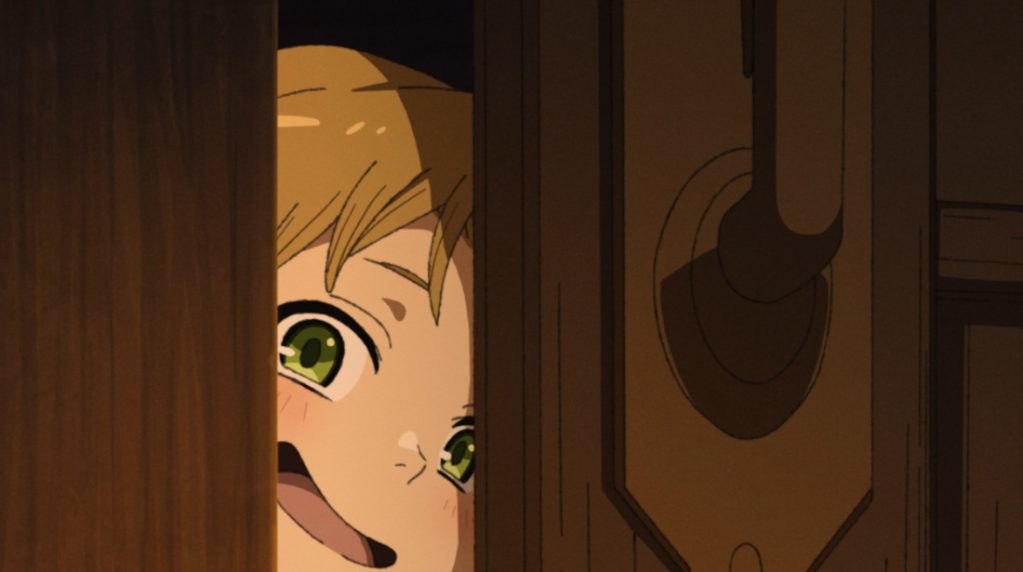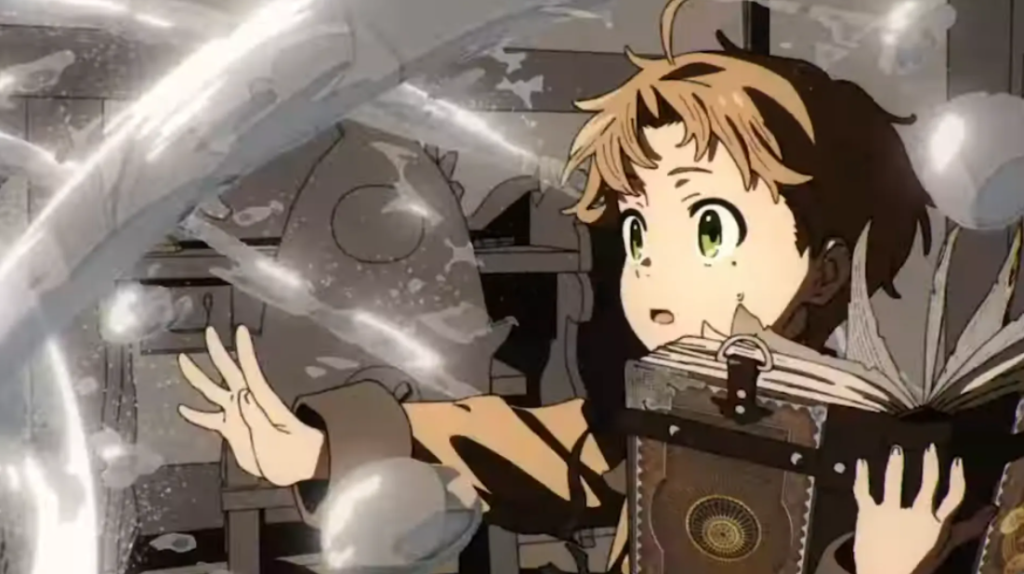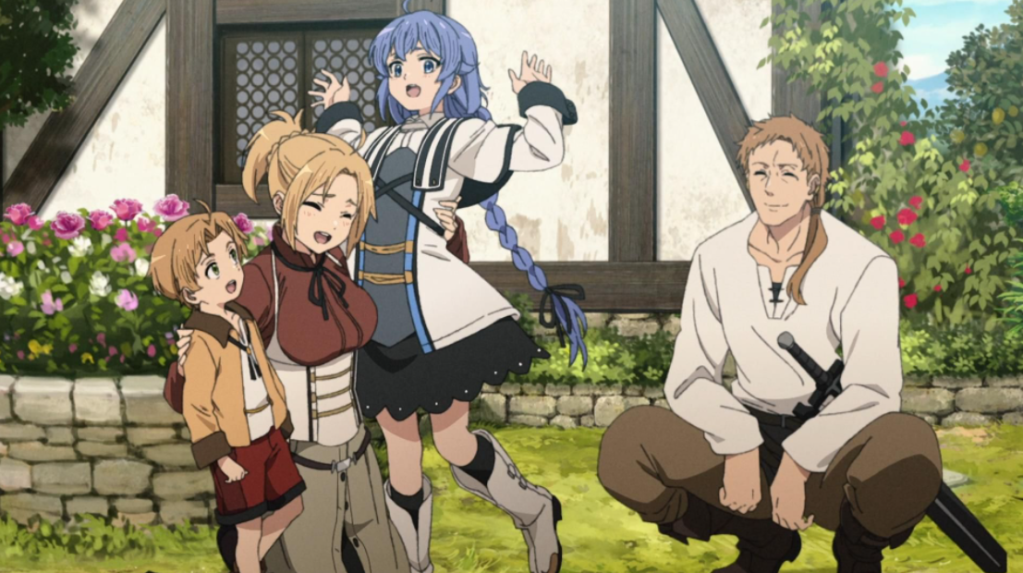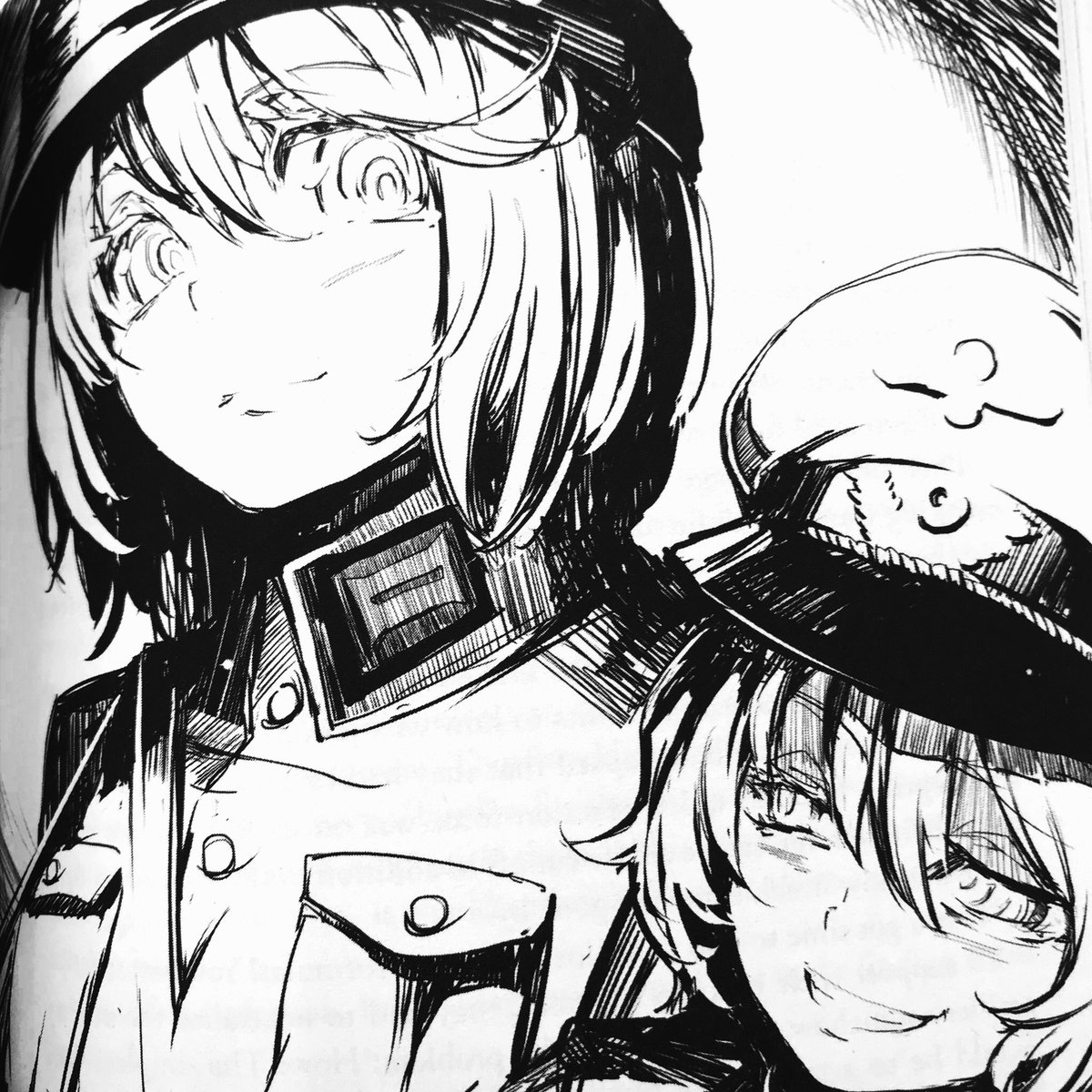A brief spoiler-free review of the 11-episode Winter 2021 series “Mushoku Tensei: Jobless Reincarnation,” animated by Studio Bind, directed by Manabu Okamoto, and based on the light novel series of the same name by Rifujin na Magonote.

Reborn in a World of Magic
A thirty-four-year-old shut-in has just about had all of life that he can handle. Even when he tries to do something heroic for once in his life, it ends in a tragic accident. Fate, however, has other plans for him, and the man awakens in another world as Rudeus Greyrat, the newborn baby of two loving parents.
With the memories from his previous life still intact, Rudeus quickly adapts to this new fantasy environment. The knowledge from his adult past allows him to latch onto the world’s magic system faster than the other kids, and before long, his parents hire a mage tutor named Roxy Migurdia to help hone his skills. Rudeus learns swordplay from his father, Paul, and makes his first friend in the beautiful Sylphiette. Although Rudeus is no knight right now, his time with the blade will come in handy when he eventually takes on his own young pupil—the fiesty Eris Greyrat—and her buff, beast-human guardian Ghislaine.
Granted a second chance at life, Rudeus endeavors to live in a way that his old self would be proud of. As Rudeus attempts to conquer the traumas of his past, he starts to believe that maybe, just maybe, there is love for him in this world after all.
Gonna have to spit this out there now, but I absolutely despise the isekai story-starter trope of reincarnation. Rarely is it explored to full effect in these shows, and often is the tragic death overlooked by episode 3. That said, Mushoku Tensei is different. Throughout the series, we receive direct narration of events not from the voice of young Rudeus, but rather that of his past self. At first, the cynical and snarky dialogue comes across as largely pessimistic and cruel. But, as Rudeus starts to make connections and brave his way outside the comfort zone, the narration slowly adopts a note of hope. And of course, Rudeus is a pervert both then and now, but you’d be surprised how well he fits the bill as “The Son of Paul Greyrat.”

THE GREYRATS ARE SCUM
I know he’s really a 34-year-old man on the inside, but boy is Rudeus a cutie. I mean, just look at that name ~Rudeus~ I love it. Although we know who he really is, no one else does, and so Rudeus plays the innocent young prodigy part remarkably well. A lot of viewers may not take to him because of this fact (plus that he’s a whole-ass pervert), but I like Rudeus, and I hope he does find that self-love and acceptance he was missing out on in his sad past.
The same well wishes cannot be said for Rudeus’ father, Paul. I won’t spoil what he does (or who he does, yikes!), but don’t let that knightly title lead you to believing that honoring and respecting women is a virtue he exemplifies. THIS MANS IS SCUM. Hell, ALL OF THE GREYRATS ARE SCUM. And yet, I still love ’em all, the horny bastards. Paul is lucky to have a charismatic babe like Zenith!
Although the kind and soft-spoken Sylphiette is who propels Rudeus to become a stronger mage, a character I believe most audiences would resonate more with is Roxy. A wonderful teacher and talented water mage, Roxy serves as a huge motivation for Rudeus. Rudeus’ graduation ceremony from Roxy’s teachings had tears welling in my eyes, and as a teacher of young students myself, I just really hit it off with her reserved yet inspiring teaching style. Roxy rarely yells, but rather guides, and her realizing Rudeus’ potential (which far exceeds her own) hit me in the feels. The prospect of eventually reuniting with Roxy incentivizes Rudeus to work hard at not only magecraft, but also other avenues of life.
Then we have Eris Greyrat, who comes in and stomps on all of Rudeus’ hopes and dreams. I kid, but she’s definitely a stubborn pain in the ass. As Rudeus’ charms slowly start to rub off on Eris, however, she becomes noticeably more tame, even likable to an extent. Were it not for Ghislaine’s overwhelming strength and presence to hold Eris back, I’m not sure how far Rudeus would have gotten in his mentorship!

Quality Character Animation
While searching for more information about the studio behind making Mushoku Tensei, it appeared to me as if this is Studio Bind’s first work—and to this, WOW, I’m quite shocked. The animation of the series keeps up with the spellcasting elements of the show just as well as the dumb ecchi-comedy moments. Specifically, it was the quality of the character animation that grabbed my interest. In fact, I had no plans to watch Mushoku Tensei until one of the sakuga-crazed Twitter accounts I follow retweeted a short animation of Roxy splitting a tree and then healing it. From that moment on, I looked forward to seeing Rudeus’ water magic develop just as much I wanted to see that perverted little face of his warp into a devilish smile.
If I’m being honest here, the whole production of Mushoku Tensei won me over far before the story’s premise. The series is accompanied by a wonderful fantasy soundtrack from the genius Yoshiaki Fujisawa. Likewise, all of the grassy plains, vast deserts, and medieval cities provide a pleasant background to the show’s relatively soft visual aesthetic. Lastly, since I watched this one subbed, I did want to toot the seiyuu voicing the project, especially Yumi Uchiyama’s cute lil’ Rudeus, Ai Kakuma’s fiery and passionate Eris, and Megumi Toyoguchi’s tough and throaty Ghislaine.

A Debauched, Self-Indulgent Comedy
Mushoku Tensei probably wasn’t meant to be this enjoyable, at least for me. The series blends ecchi and isekai elements (which I typically cannot stand) into a fantasy drama with ludicrous amounts of world-building lore and pleasure-seeking fun. In addition to the nice magic animation and memorable character design, the series also pursues themes of self-love, reclamation of youth, and goodwill to others with Rudeus’ narrative. You can tell by the end how much taller he stands, and how he’s already so much prouder of the chances he’s taken in this life than the scarring, regret-filled life of his past. With this first season, a man is finally starting to overcome his fears from being bullied and enjoy life under the sun for once. I hope he’s able to go even further in subsequent seasons.
However the story tries to move you, this dramatic character development doesn’t stop Rudeus—and all of the Greyrats for that matter—from being horny on main 24/7. The series is never afraid to have fun with itself, and it remains wholly dedicated to its cause of debauched, self-indulgent comedy. If you’re wanting an isekai fantasy series with perverse, no-holds-barred commentary (and a slice or two of redemption), step right up to the house of Paul and Zenith Greyrat—I’m sure they’d love to have you.
“The worse I am at something, the better I feel when I work at it and learn how to do it.”
Rudeus Greyrat

Afterword
I’ve spent the past weekend trying to finish all the Winter 2021 simulcasts I started months ago. It’s actually been fun seeing how some of these shows ended, and it was equally exciting to see the season two announcement for Mushoku Tensei already greenlit! While I’m guessing the story from here on will lean more on the serious side, you can bet I’ll be back for more Greyrat degeneracy when the sequel airs this summer. For those wondering, I’m welcoming Mushoku Tensei: Jobless Reincarnation as a “Cake” title here at the cafe, a show that’s not for everyone, but one that certainly scratches that itch you might’ve not have even known you had. I like the show when it’s both dumb and endearing, and that’s rare for even me to admit.
What are your thoughts on Mushoku Tensei? Do you think Paul Greyrat is scum or do you think he’s scum? Also, are you looking forward to more of this series or was this first season enough for you? Let me know your thoughts about the show or this review down in the comments! Thanks for reading, and ’til next time!
– Takuto





